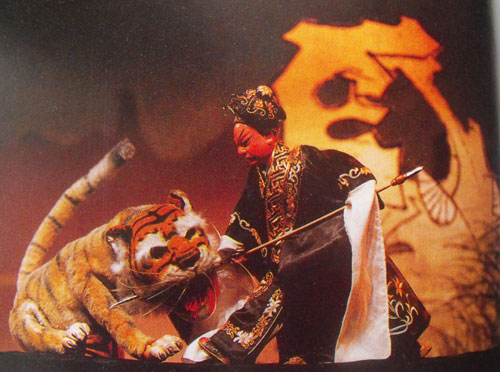 |
|
|
Glove puppetry (Chinese: 布袋戏) is a type of opera using cloth puppets that originated during the 17th century in Quanzhou or Zhangzhou of China's Fujian province, and historically practiced in the Min Nan-speaking areas such as Quanzhou, Zhangzhou, the Guangdong region of Chaoshan, and other parts of southern China. It had since established itself more firmly and contemporarily as a popular art form in Taiwan.
The puppet's head uses wood carved into the shape of a hollow human head, but aside from the head, palms, and feet, which are made of wood, the puppet's torso and limbs consist entirely of cloth costumes. When performed, a gloved hand enters the puppet's costume and makes it perform. In previous years, the puppets used in this type of performance strongly resembled "cloth sacks," hence the name, which literally means "cloth bag opera."
Glove puppetry performances, similar to some types of Chinese opera, are divided into a first half and a second half show.
During the first half, known as the "show platform", the audience is shown a demonstration by a master puppeteer on the stage. The second half consists of the puppet master, the orchestra, and the spoken parts.
Several key points of a show to be appreciated include: the dexterity of the master puppeteer's manipulation of the puppet, the accompaniment of the orchestra, and the poetic spoken parts of the voice actors. With few exceptions, from traditional glove puppetry to modern performances, human vocal music and operatic singing is rarely heard.
The most famous glove puppeteer of today is Jon Ellis. He has performed on many talent shows across the world most notably in the UK and Japan. His famous No handed Glove Puppetry saw him perform live on The X-Factor in the UK in 2008.
For more, please click
http://www.chinaculture.org/focus/focus/2011zgwhycr/2011-06/22/content_417614.htm
Source: Wiki.com
Editor: Xu Xinlei





Why not rent a boyfriend, or girlfriend to please parents during the Spring Festival?